Memphis Travel Guide
The largest city in Tennessee, most associate Memphis with the legendary king of rock n' roll Elvis Presley. Hundreds of thousands of visitors make a pilgrimage to Graceland, the mansion where he lived and died.
The city has had its hand in the shaping of modern musical forms like blues and soul too. Music fans from all over the world stroll down legendary Beale Street in the downtown area, happy to be walking in the footsteps of the blues and soul heroes.
Aside from touring Graceland there are several other music-related attractions, and a whole lot of other things to see and do in Memphis. The nightlife is world-renowned and the cuisine, particularly barbecue, is irresistible. And there are also some fascinating museums, beautiful gardens, Mississippi river boats, amusement parks and quirky cultural and natural sights to explore.
Things to do in Memphis
Memphis is synonymous with music, with tourists making the trip to visit this melting pot of talent which gave so much to the blues and rock n' roll genres. Music lovers will find every bit of this colourful city memorable, with heroes including Johnny Cash and the king himself Elvis Presley, and the significance of Beale Street.
Indeed, the most popular attraction in Memphis would be Graceland, the mansion belonging to Elvis. It's the second-most visited house in the United States (after the White House), with thousands of fans passing through its doors throughout the year.
Other favourites would be the Memphis Rock n' Soul Museum, a unique interactive museum detailing the history of rock and soul in America, along with the Stax Museum of American Soul Music that pays homage to the legendary artists recorded at the original Stax Records such as Ottis Redding, Wilson Pickett and Elvis Presley.
For those who are interested in more than just the music scene, the Memphis Botanic Gardens are a wonderful outdoors experience and can be enjoyed any time of year. Mud Island in the Mississippi River is great fun for the whole family, and Memphis Zoo is one of only a handful in the US that houses giant pandas.
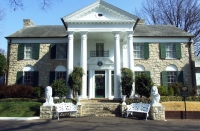
Graceland
Once the home of the King of Rock and Roll himself, Elvis Presley, Graceland is the second-most visited house in the United States after the White House. Thousands descend on Memphis to tour the icon's house and grounds, paying respects at his grave. Kept as close as possible to how it was then Elvis lived there, visitors can go on audio-guided tours of the home and trophy building. Guests are also privy to his massive collection of cars, including his renowned 1055 pink Cadillac, and two private jets. Along with general memorabilia and history, guests at Graceland can also order some 1950s and 1960s diner-style food, including the king's infamous deep-fried peanut butter, banana and bacon sandwich.
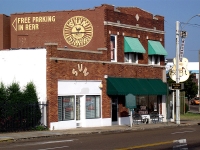
Sun Studio
Sun Studio is enshrined in musical folklore for launching legends such as Elvis, Johnny Cash and Roy Orbison on the road to stardom. Visitors to Sun Studio are privy to a great deal of memorabilia, rare outtakes from recording sessions and can even touch Elvis' first microphone. It still hosts live sessions and recordings with current artists, while for peckish customers there's always the Sun Studio Cafe, a 50s-style diner and still a favourite musician hangout. Free shuttles are on hand to transport visitors to and from either Graceland or the Rock 'n' Soul Museum.
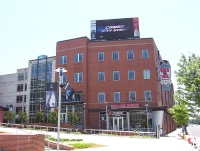
Memphis Rock n' Soul Museum
Put together by the Smithsonian Institution, the Memphis Rock n' Soul Museum is a collection of rare recordings, vintage films and interactive exhibits celebrating American musical pioneers. The building is located on the corner of the legendary Highway 61 and equally famous Beale Street, home of urban jazz and blues. From gospel to blues and rock, the museum displays memorabilia from performers such as Ike Turner's piano, B.B. King's guitar and some of Elvis's outfits. Each of its seven galleries has a specific focus, ranging from rural culture and music to the influential Sun Records. The Bravo Gallery focuses on the performers and industry players who contributed to a successful civil rights movement.
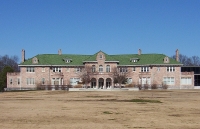
Pink Palace Museum
The Pink Palace Museum is devoted to culture and natural history. Visitors can also explore dioramas, exhibits and audio-visual displays tracing Memphis' past from the arrival of the Spanish explorers through to the Civil War and yellow fever epidemics. An award-winning medical exhibit highlights the city's development into a healthcare centre for the United States, while dinosaurs, fossils and medical history also feature. There's a planetarium at the Pink Palace, as well as an Imax theatre, nature centre and science centre. Nearby are two further houses of historical interest. The Magevney House is an 1830s clapboard house built by Irish immigrants, and the Mallory-Neely House, a 25-room abode built in 1852. Both still have their original furnishings.
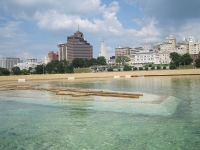
Mud Island River Park
Mud Island on the Mississippi offers fascinating insight into the famous river with a series of immersive and informative attractions. The Mississippi River Museum focuses on the history of the Mississippi, as well as the engineering, discovery and settlement of the river and its banks. There's also a display of the Memphis Belle, a famous B-17 bomber from World War II. But the highlight is the River Walk, five blocks long and representing a journey of 1,000 miles (1,609km) from Illinois to Louisiana, ending in a scaled down Gulf of Mexico. Visitors can rent paddle boats, canoes and kayaks, as well as mountain bikes, for exploring.
Memphis Botanic Garden
The delightful Memphis Botanic Gardens are found on a 96 acre (39 ha) site at Audubon Park. There are around 30 gardens and each of them are designed according to themes or species, ranging from the Japanese Garden of Tranquillity to the magnificent Municipal Rose Garden. Favourites include a children's garden, the Sensory Garden designed to be enjoyed by the disabled and the Iris Garden, at its best in April and May. There are also popular events such as the weekly farmers markets on Wednesdays from April to October, while there are evenings of wine tastings on Tuesdays from February to October. Three annual plant sales are hosted by the gardens, with proceeds going to various educational and horticultural programs. There are also live concerts in summer, perfect for picnics.
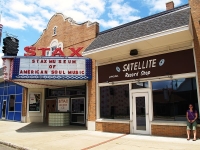
Stax Museum of American Soul Music
The Stax Museum of American Soul Music details the history of the most successful soul music studio in history. Continuing the legacy of Stax Records, the museum pays tribute to all the artists who recorded there, including the likes of Isaac Hayes, Otis Redding and the Staple Singers. There's a rare and astonishing collection of two thousand interactive exhibits, films and artefacts, as well as general memorabilia and galleries. The museum also gives nods to other influential labels in the genre such as Motown, Hi and Atlantic, with giants such as Aretha Franklin, Ray Charles and the Jackson Five receiving praise despite not being part of the Stax stables. It's also important to realise Stax is a cultural phenomenon, starting out at a time when segregation was still a grim reality in the United States.
Getting Around
Public transport is not very reliable in Memphis and the most efficient way to cover the sprawling city is by renting a car, although you may find traffic congestion on major roads. The city is simple to navigate and parking is generally easy to find. To hire a car, drivers must be 21 years old, with most agencies having higher rates for under-25s. Some require an International Driving Permit as well as a valid driver's license.
Public transport is available, consisting of slow and infrequent buses. But there are also shuttle buses that operate around the main attractions in the city centre, which visitors may find more convenient. The famous vintage electric trolleys are a popular way for tourists to get around the city while taxis, Uber and Lyft all operate in the area.
Memphis Climate and Weather
Memphis has a humid subtropical climate, and experiences four distinct seasons with cold winters and hot summers. Spring and autumn can be varied and unpredictable and severe weather, like thunderstorms and strong winds, is possible during these transitory seasons. Summers are very humid thanks to moisture encroaching from the Gulf of Mexico, and while the temperature rarely reaches great heights; it tends to feel hotter than it is. Summer temperatures average between 70F (21C) and 92F (33C). Winters, by contrast, can be fairly cold with temperatures averaging between 32F (0C) and 52F (11C). Memphis averages 3.8 inches (9.7cm) of snow a year. There is plenty of rain to keep the region green, most falling in thunderstorms.
United States of America travel info
Electricity
The electrical current is 120 volts, 60Hz. Plugs are mainly the type with two flat pins, though three-pin plugs (two flat parallel pins and a rounded pin) are also widely used. European appliances without dual-voltage capabilities will require an adapter.
Language
English is the most common language spoken but Spanish is often heard in the south-western states.
Money
The official currency is the US Dollar (USD), which is divided into 100 cents. Only major banks exchange foreign currency. ATMs are widespread and credit cards are widely accepted; Apple Pay and Google Pay are very popular. Banking hours are Monday to Friday 9am to 3pm.
Tipping
A 15 percent tip is expected by taxi drivers, bartenders, hairdressers and waiters, but travellers shouldn't tip in fast-food or self-service restaurants. In expensive restaurants or for large parties, the tip should be 20 percent of the bill. It's normal to tip staff such as valets and porters in hotels; this is discretionary, although a minimum of $5 is expected. Most services are customarily tipped if the service is good.
Health
There are no specific health risks associated with travel within the USA. Medical facilities are excellent, but expensive. Only emergencies are treated without prior payment and treatment can be refused without evidence of insurance or proof of funds. Good medical insurance is essential.
Safety
Travel within the United States is generally trouble-free, though travellers should be aware that the US shares with the rest of the world an increased threat from terrorist incidents. Security has been heightened, particularly at airports. Restrictions on hand luggage apply and travellers are advised to check on the latest situation with airlines in advance. Travellers should also be alert to the dangers of car and street crime in cities and should use common sense and take basic precautions. Hurricanes are common between June and November, putting the southern USA, including the Gulf Coast and the eastern US at risk. There's a risk of wildfires in many dry areas in the US, particularly on the West Coast from March to November.
Local customs
Laws vary from state to state, including speed limit, fines and punishment. The age at which alcohol may be legally bought and consumed is 21 years.
Doing business
In such a large country, filled with so many diverse groups, business practices may differ according to each state, though rarely to any large degree. The East Coast is traditionally more formal than the West Coast, though in states such as California, dress code and conservative appearance are as common as they would be in New York. Punctuality is important throughout the country and it's considered rude to be late for a meeting. Gift-giving is uncommon as it may be construed as bribery. Appropriate titles (Mr, Mrs, Ms) are used upon introduction and until otherwise stated. Americans favour politeness and greetings of 'Hello' and 'How are you?' are often expressed with sincerity. Business hours may vary in each state, but an 8am start and 5pm finish Monday to Friday is the most common with an hour over lunch.
Status and age are not necessarily indicative of seniority, nor do they carry much weight in themselves. Those doing business in the States should be mindful of this fact; foreigners should never make assumptions about someone's position or rank. Best practice is to be respectful to all parties. That said, the US upholds a hierarchal business structure in which 'the boss' is the ultimate decision-maker. Senior leaders have the power of the last word, and can go against the grain just as easily as they can follow popular opinion. Foreigners should concentrate on winning over this individual, even if the greater group seems unsupportive. Americans value a direct style of communication. In this fast-paced, consumer culture 'time is money', and small-talk is viewed as unnecessary and wasteful. It's best for foreigners to get to the point quickly, speak about issues in a frank and open manner, and to avoid taking offence if someone questions or challenges them outright.
Duty free
Travellers to the United States who are returning residents of the country do not have to pay duty on articles purchased abroad to the value of $800 provided their stay was longer than 48 hours and their duty-free allowance was not used in the 30-day period prior. For passengers arriving from Samoa, Guam and the U.S. Virgin Islands, a duty-free allowance of $1,600 is allowed. The following items are included in this: 50 cigarettes and 10 cigars and 150 millilitres (5 fl. oz.) of alcoholic beverages or 150 millilitres (5 fl. oz.) of perfume containing alcohol. Restrictions may apply to goods from Cuba, Iran, North Korea, Burma (Myanmar), Angola, Liberia and Sudan. It is prohibited to import Cuban cigars from any country.
Travellers to the United States who are non-residents do not have to pay duty on the following items: 50 cigars or 200 cigarettes and gifts to the value of $100 provided their stay in the USA is not less than 72 hours and that the allowance has not been used in the preceding six-month period.
Prohibited items for residents and non-residents include meat or meat products, poultry, narcotics, absinthe, plants, seeds, vegetables, fruits, soil, live insects and other living plants or animal pests. Fish is prohibited unless it carries disease-free certification. Wildlife and animals or their by-products carry restrictions. Dairy products and eggs from specified countries are not allowed. Firearms and ammunition are not allowed without the necessary license and permit.
Communications
The international country dialling code for the United States is +1. Mobile networks cover most of the country, especially all urban areas; travellers can purchase local prepaid SIM cards for unlocked phones or use eSIMs if their cellular providers support it on their networks. WiFi is widely available.
Passport & Visa
It is highly recommended that travellers' passports have at least six months' validity remaining after the intended date of departure from them travel destination. A visa is required for short visits unless travellers qualify for entry under the Visa Waiver Program.
The Visa Waiver Program (VWP) enables citizens of certain countries to travel to the US for a stay of up to 90 days without a visa. Visitors under the VWP need a valid Electronic System for Travel Authorization (ESTA), which allows the US government to screen all visitors before travel. Visitors entering the country under the VWP must have a machine-readable passport (MRP) that has a barcode on the photo page. Travellers under the VWP must have passports that include biometrics if they wish to enter the country without a visa, which means that passports must contain unique personal data such as fingerprints or iris details. All passports must contain a digital photo image in order to travel visa-free. All visitors to the USA have a photograph and two fingerprints taken by an inkless scanner on arrival, including those travelling visa-free under the VWP.
As part of the Western Hemisphere Travel Initiative (WHTI), all travellers travelling between the United States and Canada, Mexico, Bermuda, and the Caribbean region are required to present a passport or other valid travel document to enter or re-enter the United States. If departing from the USA, a valid passport is required by immigration authorities. Immigration officials often apply different rules to those stated by travel agents and official sources.
Entry requirements
US citizens require passports.
UK nationals require a passport valid for duration of stay. Most passport holders can get an Electronic System for Travel Authorisation (ESTA) through the Visa Waiver Programme, which allows travel to the US for up to 90 days. The VWP includes tourism, certain types of business visit and transit to another country.
The most important requirement on entering the U.S. is providing proof of Canadian citizenship. A valid Canadian passport is the best document to prove Canadian citizenship and the right to return to Canada. However, several other documents can serve, depending on the mode of transport. Generally, Canadian citizens do not require visitor, business, transit or other visas to enter the United States from Canada, though there are some exceptions.
Passports must be valid for the period of intended stay. If visiting the US for fewer than 90 days, Australian nationals may be eligible to apply for an Electronic System for Travel Authorization (ESTA), and enter under the Visa Waiver Program (VWP).
South Africans must hold a passport valid for duration of stay. A visa is required.
Passports must be valid for duration of stay. Irish nationals can get an Electronic System for Travel Authorisation (ESTA) under the Visa Waiver Programme for entry into the United States.
Passports must be valid for duration of stay. New Zealand nationals can get an Electronic System for Travel Authorisation (ESTA) under the Visa Waiver Programme for entry into the United States.
Useful contacts
United States Tourist Office: www.usatourist.com
911 (General)Embassies / consulates in other countries
United States Embassy, London, United Kingdom: +44 20 7499 9000.
United States Embassy, Ottawa, Canada: +1 613 688 5335.
United States Embassy, Canberra, Australia: +61 2 6214 5600.
United States Embassy, Pretoria, South Africa: +27 12 431 4000.
United States Embassy, Dublin, Ireland: +353 1 668 8777.
United States Embassy, Wellington, New Zealand: +64 4 462 6000.
Embassies / consulates in United States of America
British Embassy, Washington DC: +1 202 588 6500.
Canadian Embassy, Washington DC: +1 202 682 1740.
Australian Embassy, Washington DC: +1 202 797 3000.
South African Embassy, Washington DC: +1 202 232 4400.
Irish Embassy, Washington DC: +1 202 462 3939.
New Zealand Embassy, Washington DC: +1 202 328 4800.



